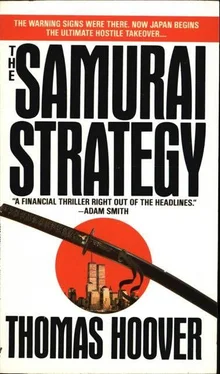Thomas Hoover - The samurai strategy
Здесь есть возможность читать онлайн «Thomas Hoover - The samurai strategy» весь текст электронной книги совершенно бесплатно (целиком полную версию без сокращений). В некоторых случаях можно слушать аудио, скачать через торрент в формате fb2 и присутствует краткое содержание. Жанр: Триллер, на английском языке. Описание произведения, (предисловие) а так же отзывы посетителей доступны на портале библиотеки ЛибКат.
- Название:The samurai strategy
- Автор:
- Жанр:
- Год:неизвестен
- ISBN:нет данных
- Рейтинг книги:5 / 5. Голосов: 1
-
Избранное:Добавить в избранное
- Отзывы:
-
Ваша оценка:
- 100
- 1
- 2
- 3
- 4
- 5
The samurai strategy: краткое содержание, описание и аннотация
Предлагаем к чтению аннотацию, описание, краткое содержание или предисловие (зависит от того, что написал сам автор книги «The samurai strategy»). Если вы не нашли необходимую информацию о книге — напишите в комментариях, мы постараемся отыскать её.
The samurai strategy — читать онлайн бесплатно полную книгу (весь текст) целиком
Ниже представлен текст книги, разбитый по страницам. Система сохранения места последней прочитанной страницы, позволяет с удобством читать онлайн бесплатно книгу «The samurai strategy», без необходимости каждый раз заново искать на чём Вы остановились. Поставьте закладку, и сможете в любой момент перейти на страницу, на которой закончили чтение.
Интервал:
Закладка:
That was it. Kenji Asano had a head count. Watanabe was against sending MITI personnel. Kitano was waffling. Hiromu Ikeda was foursquare and hell-bent in favor of the idea. He had just announced it to the room.
Was Watanabe in league with Noda, willing to give him free rein? Was he one of Noda's operatives inside the ministry? Or was he merely advancing his own ideas, genuinely fearful an influx of MITI personnel into the U.S. could precipitate a severe diplomatic flap?
On the other hand, why was Ikeda so in favor of having MITI move in on Noda? The answer to that was hardly a puzzle. MITI's young prince of ambition, Hiromu Ikeda, scented the possibility of grabbing a part of Matsuo Noda's new American empire for his own. Handled skillfully, it might well catapult him directly to vice minister inside a decade.
"Perhaps it would be useful to review once more the main elements of the situation." Kitano knew he had the middle ground and thus was offering to arbitrate. "The condition of America now is very troubling. The question is, how can we best aid them, and ourselves. We in Japan realize that a nation's true strength is ultimately not in armaments but in the health of its economy, its industry. Yet the Americans, by making themselves a military state, have paradoxically imperiled their real security. How long can we continue to rely on an ally so blind to the main threat to its own strategic well- being? Matsuo Noda is correct. Our very safety may soon be imperiled. Something must be done. The only question is how best to proceed."
"So desu ne." Watanabe pressed, realizing he would have to force his point. "The Pentagon is, ironically, America's most insidious enemy. Japan's greatest benefit from America's defense umbrella has not been the billions we've saved on sterile arms; it has been the technical manpower we have free to support competitive industries. But the price has been the industrial decline of our foremost ally. This cannot, must not, be permitted to continue." He paused. "Matsuo Noda, a man I've known and respected for years, who guided this ministry to greatness, should be allowed to assist the Americans rebuild their civilian sector unhindered by us. If MITI involves itself at this time, the American government may well grow alarmed and step in to stop him. Then their industrial stagnation will merely accelerate."
"So deshoo," Ikeda finally spoke. "I agree. Unfortunately, however, there are some who believe the task Noda-sama has undertaken cannot succeed without direct MITI assistance. Again it is a matter of our own security. The question has arisen concerning whether we should continue to rely on the Americans to rescue their industrial base unassisted by any formal direction. Of course I disagree with such pessimistic views, but some would say we ourselves must now step forward and assume global leadership in technology to prevent a vacuum from developing in the Free World. By taking charge of America's floundering high-tech sector, we could rescue it from continued mismanagement, while-incidentally-satisfying our own R amp;D needs in a way that is extremely cost- effective. However, this can only be achieved if we are in a position to provide hands-on guidance. Which means direct MITI involvement." He paused. "These opinions of course are not my own, merely ones I have heard voiced. I am told, though it is difficult to comprehend, that this viewpoint has been entertained by Nakayama-sama of the Secretariat, and even discussed in his weekly conference with the Parliamentary Vice Minister."
The hand of fate! Asano exulted. Hiromu Ikeda has already done my work for me. He's gone over everybody's head. He swallowed the idea like a carp snapping a hovering dragonfly, then went off and peddled it to the Vice Minister as though it were his own.
A man to watch out for in the future, he thought. But a perfect ally at the moment.
Watanabe said nothing. His ancient face was in shock. Everybody realized the meeting was over. It was clear Ikeda had trampled on consensus and seniority in order to further his own fortunes.
"Watanabe-san, I think we all agree your understanding of the situation is entirely proper," Kenji Asano said soothingly. "But solely in the interest of continued theoretical discussion at some later time, it might be prudent if all sections prepared a contingency list of staff, fluent in English, who would be suitable for reassignment to an American sector."
"It is always wise to cover contingencies, Asano-san," Watanabe said dryly.
None of them realized it, of course, but Hiromu Ikeda's ambition could well turn out to be the salvation of MITI itself. But for now, Asano mused, that was something none of them needed to know.
Looking out the window at the freezing streets below, glimmering from headlights and neon, Kenji Asano told himself that a dangerous game lay ahead. Noda's first gambit had been countered, but there would be more. What he needed was a preemptive strike.
He had made the plans for that strike, a play of pure, absolute genius. The catch was, Tamara would have to cooperate.
With that thought he reached down and unlocked the top right-hand drawer of his metal desk, then drew out a large red and blue envelope. It was air express from a university address in California. As he fingered the stripes along its side, he recalled how it had arrived here at his office at The Institute for New Generation Computer Technology while he'd been in Kyoto with Tamara.
Finally he opened it again and slipped out the contents. Inside was a confidential memo on the old Nippon, Inc. letterhead, unsigned but obviously authored by Matsuo Noda, a top-security document that had been clocked in at a document station at Tsukuba Science City. How had Allan Stern stumbled onto this? Had he stolen it? Picked it up by accident? It was in Japanese, so how could he have sensed its real import?
American ingenuity, he told himself, defied all understanding. The memo, which outlined the timetable for a massive scenario, had been the first step of a long path of discovery leading Kenji Asano to indisputable proof of Matsuo Noda's real objective. Allan Stern must have had this translated or somehow intuitively guessed Noda's plan. And then… Allan Stem had tried to warn MITI. Why? Out of past regard for Dr. Yoshida, former head of the Institute and a close friend?
Stern reportedly had vanished the same day this envelope was postmarked. Noda had acted, but not swiftly enough.
Who at MITI had been the original recipient of this memo? Maybe, he thought, it no longer mattered. There was only one real way to stop Dai Nippon…
At that moment his phone buzzed. As he punched the button, his flustered secretary announced that an in-flight call was waiting, channeled through MITI's satellite security link. It was the president of Dai Nippon, International.
CHAPTER TWENTY-ONE
Tsukuba Science City can be awe-inspiring or a specter, depending on how you choose to look at it. The time was Wednesday morning, and Tam and I were viewing the place through the tinted windows of Matsuo Noda's personal DNI limo, the black Nissan she knew so well. From the vantage of an elevated freeway packed with rows of sleek Hondas and Toyotas sparkling in the cold December sunshine, we could see the silhouettes of cluster after cluster of modernistic concrete towers, an urban complex of a hundred and fifty thousand souls rising above what was, only a few short years ago, mostly farms. Be that as it may, take my word for it that nobody's growing radishes there today. Science City, nestled in the foothills of Mt. Tsukuba some fifty kilometers northeast of downtown Tokyo, represents a government investment, including the industrial park once the site of Expo '85, of over thirty billion dollars.
Tsukuba is holy ground, the place of heroes, where kamikazes once trained for their suicide missions against the American fleet. Now it is one of the largest research centers in the world, with almost ten thousand scientists and fifty separate laboratories and scientific institutes. As we neared the first complex, I tried to make sense of all the Dali-esque curved buildings that housed Japan's new brain trust. From the outside you can tell something is going on, but it seems secretive and proprietary. It is. The thing I had to keep reminding myself, though, was that none of this was for military boondoggles. It was aimed dead-on at industrial technology. E.g., there's research here on high-energy lasers all right, but they're not intended for zapping some hypothetical Soviet satellite; they're part of the world's largest laser-radar telescope, which can project beams out more than thirty miles to analyze air quality. In short, the work here was applications-oriented, practical, and-get a firm grip on your wallet- commercial.
Читать дальшеИнтервал:
Закладка:
Похожие книги на «The samurai strategy»
Представляем Вашему вниманию похожие книги на «The samurai strategy» списком для выбора. Мы отобрали схожую по названию и смыслу литературу в надежде предоставить читателям больше вариантов отыскать новые, интересные, ещё непрочитанные произведения.
Обсуждение, отзывы о книге «The samurai strategy» и просто собственные мнения читателей. Оставьте ваши комментарии, напишите, что Вы думаете о произведении, его смысле или главных героях. Укажите что конкретно понравилось, а что нет, и почему Вы так считаете.












